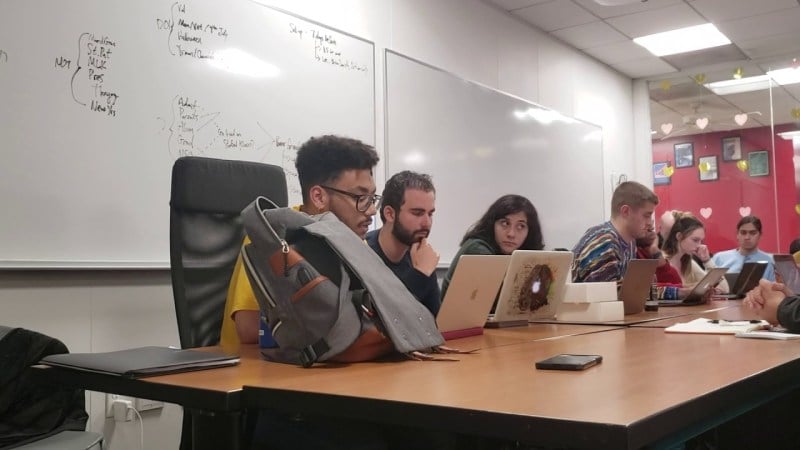On Thursday afternoon, the 24th Undergraduate Senate (UGS) unanimously approved annual grants for around 135 of the 200 Voluntary Student Organizations (VSOs) that applied for funding. Of the VSOs that were approved for funding, only 29 organizations received the full monetary amount they requested.
The UGS received a record number of applications for annual grants this year, with the sum across all grant requests totaling $6.8 million. Of the total requested amount, the UGS approved around $3.3 million. Groups that received significantly less funding than they requested include the Kappa Sigma fraternity, Stanford Lion Dance, Stanford Transfers Network and the Stanford India Economic and Policy Club. Some organizations, such as the Society of Latinx Engineers (SOLE), have circulated petitions regarding their funding cuts.
Natalie Hilderbrand ’23, Financial Officer of Stanford Club Sports, said that she was concerned that the funding levels that had been proposed for her organization were much lower than requested. “Your funding is not sufficient to cover remotely close to all the undergrads we are trying to support,” Hilderbrand said at the meeting.
As a VSO, Stanford Club Sports oversees over 40 teams. The organization submitted a request for over $440,000 in funding and is instead receiving around $280,000. Stanford Club Sports has both undergraduate and graduate students as members, which means that both the UGS and the Graduate Student Council (GSC) could grant funding to the organization. However, the laws that govern GSC annual grant approvals are different from UGS, which affected the outcome of Stanford Club Sports’ funding.
According to Hilderbrand, the funding calculations conducted by the UGS and GSC were different both from one another and from the calculations conducted by Club Sports. When the UGS allocated funding for Club Sports, they took “the percentage of overall club sports members that are undergrads and applied that percentage to our overall budget request,” Hilderbrand said. The GSC, however, conducted the calculations for funding allocations on a sport-by-sport basis.
Currently, 58% of Club Sports members are undergraduates. According to the undergraduate senators, UGS provides funding to cover the proportion of undergraduates in the organization. However, the number of undergraduates in the most expensive club sports are disproportionate to the number of graduate students, meaning that not all of the sports are receiving equal funding.
“I feel like we can’t fund you more than this,” Senator Amira Dehmani ’24 told Hilderbrand. “You need to go to the GSC.” Hilderbrand disagreed with Dehmani and argued that the funding cuts were the fault of UGS, not the GSC.
After hearing these concerns, the UGS decided to table the vote on Stanford Club Sports’ funding approval for next week.
The UGS also reviewed a resolution to permit the Leland Stanford Junior University Marching Band (LSJUMB) to receive ASSU annual grants. In recent years, LSJUMB has become part of the athletics department and ceased to operate as a VSO, technically forbidding it from receiving annual grants from the ASSU. Despite this technicality, the ASSU has continued to fund the LSJUMB with grants used for instrument repair and travel fare. This proposed resolution would allow the funding to continue.
If the resolution is passed, then it would “legitimize the fact that the University has taken over the band” and has removed the organization’s student autonomy, Senator Mark Huerta ’24 said. He questioned the “capacity” to which the UGS could support the band.
“I don’t think we should make any big budgetary decisions about cutting them without fully understanding the band’s financial situation,” Senator Diego Kagurabadza ’25 said.
The UGS motioned to postpone the bill.
Senators also heard a presentation on tech equity at Stanford from Jacob Neidig ’23, who presented on behalf of several groups including Apple and Graduate Student Studies.
According to Neidig, FLI students at Stanford don’t always have access to the same types of technology as their wealthier peers, making it more difficult for them to succeed in school. Neidig recounted one example where a student struggled in CS106A because his computer didn’t support the programming software the class was working on. The student was afraid to go to office hours for help due to fear of not having a computer that supported the program.
To help level the playing field, Neidig presented a program that would allow FLI students to receive technology like computers and iPads for the duration of their time at Stanford. Any student who is eligible for the Opportunity Fund would be eligible for this program.
Neidig encouraged the UGS to support this proposal. Following the presentation, senators asked Neidig about how the program differs from the current technology loan program at Lathrop Tech Services and whether Neidig had any data regarding how many students face technology disparities.
The UGS also heard a resolution addressing police violence on campus and a bill to designate an ASSU librarian. Both of these measures were tabled.
